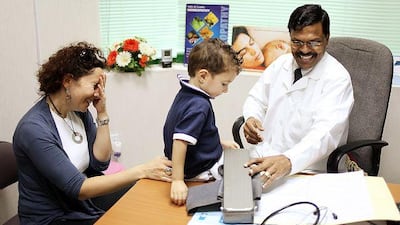ABU DHABI // Homeopathic practitioners and their patients are lobbying for health insurance firms to cover treatments. Specialists who practise the unconventional system of alternative medicine - said to have been founded in Germany and administered for 200 years - have been trying to legitimise themselves to insurance companies, many of which do not include homeopathy in standard packages.
Proponents argue that as thousands of people in the UAE, particularly those from the subcontinent, regularly use the treatments and because they are accredited by the Health Authority-Abu Dhabi (HAAD), homeopathy should be recognised by insurance firms. For Bindu Nair, who works at the Ahalia Hospital, the insurance obstacle means that many would-be patients cannot afford to try her treatments. "Patients come to us every day and ask if they would be getting covered," she said.
"When we tell them all the insurance are not covering consultation and homeopathic medicines, they find it difficult. They're reluctant. Some just leave the consultation." Her colleagues agreed that only "affluent" patients can pay out-of-pocket for the consultations and medicines, which can cost 10 times their price in India after shipping and labelling. To shore up the emirate's burgeoning homeopathic movement, the homeopathic community started this year to hold monthly "continuing medical education" meetings. By proving they are serious about the science, they hope that the Ministry of Health may take up their cause with insurance providers.
"Many revolutions started in small rooms," said Shaikh Rahman, one of the specialists at the meeting in a clinic behind Hamdan Street. "This is the same." Their push comes during hard times for homeopaths. Fewer than a dozen are approved by HAAD to practise in the emirate. Annu Mathews, a popular homeopath in Sharjah, has struggled to find work since moving to Abu Dhabi in 2006. "I'm feeling I'm wasting my time, my knowledge," she said.
Others are frustrated with restrictions on registered medicines. Last week, the British Medical Association dismissed homeopathy as "witchcraft", urging the UK's National Health Service to stop funding homeopathic therapies, and condemning homeopathy as no more effective than placebos. France and Denmark cover homeopathy at least partially under their national health insurance. The UAE's national health insurance company, Daman, does not, saying "its efficiency and results are not proven by studies according to scientific international standards".
Rightly so, according to homeopathy's detractors, who argue that the key principle of the treatment - that heavy dilutions of natural substances or even toxins such as mercury can cure ailments by stimulating the body's immune system - is quackery. As an alternative to antihistamine drugs, for instance, a homeopath might prescribe pollen "globules" or diluted sulphur to clear a rash. Peer-review journals have also called homeopathy into doubt. A study published in the British medical journal The Lancet in 2005 found no difference between homeopathic medicines and placebos in 110 trials.
However, homeopathic doctors working in the capital argue that HAAD already recognises the value of their treatments, because it has registered several specialists since last year. The first among them was Mapolin D'Souza, a specialist for 13 years who trained in India. "Lots of patients want to go for homeopathy, but because of this insurance they try to avoid it," said Mrs D'Souza, who sees patients from Canada, Australia, Pakistan and India.
"But actually it's more practised in Dubai and Sharjah. In Abu Dhabi, there's not much knowledge about homeopathy." Abu Dhabi also has stringent licensing requirements, with specialists required to pass rigorous exams to qualify to practise alternative medicine. Sassan Behjat, the former director of the Ministry of Health's complementary and alternative medicine department, helped to integrate complementary medicine into the national health care system several years ago by setting up the regulatory framework.
He left the ministry in 2008 and currently sits on Dubai Healthcare City's Complementary and Alternative Medicine Council. "Passing the complementary examination in Abu Dhabi is tougher than in the other emirates, because we wanted to ensure there were only the most qualified people," Mr Behjat said. "There was only a 12 per cent pass rate during my years there." Health insurance companies should recognise licences are difficult to obtain, the homeopaths believe.
"We are not against regulations," Mrs Nair said. "We're saying that if they're making it so strict to practise homeopathy, then insurance should also be covering for it." The major obstacle is the lack of science and study to prove to the companies that homeopathy works. "We have not had a proper set of evidence to show to the insurance companies and say, 'At least for these cases - upper respiratory tract infection, asthma, allergy cases, non-life threatening conditions - homeopathy can be of use'."
Santhosh Kumar, a homeopathic doctor with a clinic in Abu Dhabi, said sceptics might be persuaded by the successful treatment of babies too young to have formed biases. "We treat so many infants," he said. "So how does an infant know what's placebo?" The lack of homeopaths also put off companies that made the medicines they administered, making them reluctant to send special batches with UAE-compliant labels if there was no perceived demand, Mr Behjat said. "The importers don't find it viable to register more medicines," he said.
HAAD's Scope of Practice in Traditional Complementary and Alternative Medicine (TCAM) does not refer to homeopaths as "doctors", but it acknowledges that "TCAM practitioners can offer hope to patients." Dr Bhanu Sanjayan, a paediatrician in the capital, said he would never refer his patients to homeopaths. "I don't believe it works, so I don't think it's worth it to cover." Dr JP McCulloch, a family doctor in Abu Dhabi, said: "I doubt they'll ever be covered because the insurance companies can see this as another point of haemorrhage for them."
@Email:mkwong@thenational.ae

